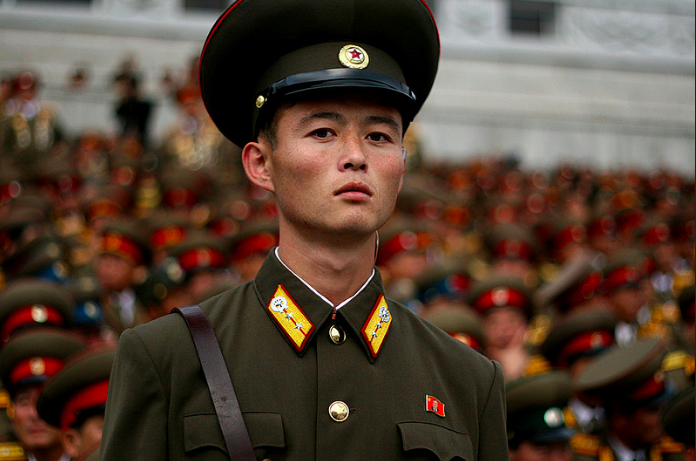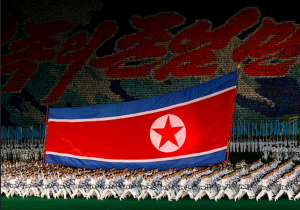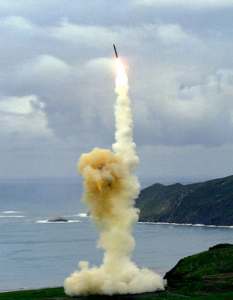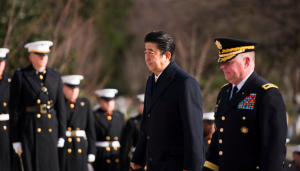The North Korean Missile Crisis: The Dawn of Japanese Rearmament
 North Korean Soldier
https://flic.kr/p/5EtpDn
North Korean Soldier
https://flic.kr/p/5EtpDn
On the 6th of March 2017, North Korea launched four ballistic missiles towards the Sea of Japan. Three of the missiles landed in Japanese territorial waters, which North Korea claimed were launched in preparation to target US military bases in Japan. Analysis of the missiles and their range has convinced Tokyo that a nuclear strike by Pyongyang is now within the realm of possibility. For great power nations, having a hostile neighbour with missile capabilities is a threat that has to be met. However, due to the fact that the Japanese constitution prevents it’s military from assuming any offensive capabilities, North Korea gaining missile capabilities is a serious threat to Japanese national security.

https://flic.kr/p/5mmqrs
Since the end of World War II and subsequent drafting of the Japanese constitution, the United States has been in charge of offensive operations for Japan. When Japan lost WWII, the United States took it upon themselves to draft a new constitution for Japan that prohibited Japan from gaining offensive military capabilities. This was done in order to punish Japan for Pearl Harbor and in order to prevent Japan from attacking the US again. Essentially, Japan is admitted self-defense forces while the US, with a massive military base located in Osaka, is in charge of offensive measures.

https://flic.kr/p/5EtpDn
Due to this unique restriction on Japanese military capabilities, North Korea is a much greater threat to Japan than it would be to any other nation. Currently, Prime minister Shinzo Abe is urging the defense minister of Japan to remilitarize. Hiroshi Imazu, the chairman of the Liberal Democratic Party’s policy council on security, stated, “It is time we acquired the capability. I don’t know whether that would be with ballistic missiles, cruise missiles or even the F-35 (fighter bomber), but without a deterrence, North Korea will see us as weak.”
In international security, most often the threat of retaliation is enough to deter most nations from attacking another. But if the other nation does not possess the technology to thwart the other actor, it becomes very difficult to be seen as a credible threat. For Japan, being percieved as weak raises the chance of North Korean aggression.Japanese remilitarization would also alter the regional balance of power in East Asia. Their historical rival and geographical neighbor, China, would most likely not take well to Japanese rearmament. Although former defense minister Itsunori Onodera commented, “China has missiles that can hit Japan, so any complaints it may have are not likely to garner much sympathy in the international community.” US President Donald Trump has also tried to urge other powers in the region to increase the defense of the region. President Trump also increased security along the South Korean border, attempting to signal to North Korea the severity in which the international community views its actions.

https://flic.kr/p/RPr9ok
In response to the threat, Japan is considering engaging in a pre-emptive strike against North Korea. Currently, Japan uses an Aegis system at sea to intercept missiles mid-flight and a Patriot system on land to intercept incoming missiles. While Japan is currently projected to spend 1 billion dollars to upgrade its current system, it is also looking into acquiring the Terminal High Altitude Area Defense (THAAD) system, which would add a third level of defense to their system. But there are doubts as to whether or not the system would hold up in the event of a “saturation attack”, in which a barrage of missiles are launched against Japan. Although this is a step in the right direction, it is a costly endeavor that will likely take years to implement. In addition, China and Russia would not be pleased if Japan upgraded their security system because it would give Japan additional insight into the missile capabilities that the two nations possessed. This comes at a time in which Japan and China are still in dispute over the Senkaku islands. The Senkaku islands lie in the East China Sea, and have been under Japanese control since 1895. But China has been contesting the claim, and the result has been a lasting dispute between the two nations.
The international community is now seriously taking North Korea’s threat of nuclear war. Currently, North Korea is still at war with the United States and South Korea. The recent missile launch solidifies the threats that North Korea has been making, and ensures that it is only a matter of time before North Korea gains both intercontinental-range ballistic missiles, or even worse – nuclear capabilities. North Korea is disrupting the regional security balance, posing a new threat to commerce and tourism in the area. As Japan weighs the benefits of acquiring offensive weaponry, the US and South Korea are beginning to strategize over ways to reign in North Korea. While gaining offensive capabilities is a step in the right direction, given the amount of time it takes to secure and install such systems, it has yet to be determined if it is not too little too late.
